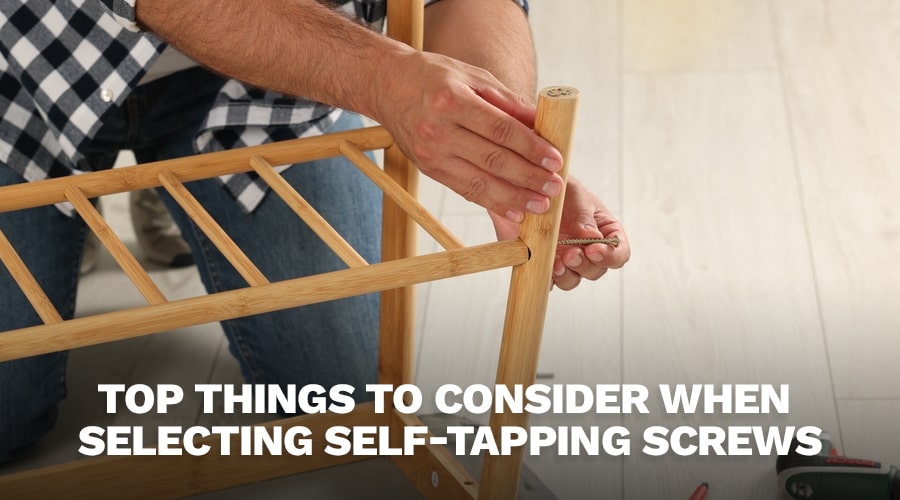


When it comes to light furniture projects, home repairs, or even professional construction work, one often-overlooked hero of the fastening world is the self tapping screw. These underrated champions offer a straightforward solution for joining or bonding different materials. The key to a successful project lies in selecting the right self-tapping screw for the concerned project. In this blog, we’ll walk you through the top considerations to make when choosing self-tapping screws, ensuring your fastening needs are met with precision and reliability.
The first and most crucial factor to consider when selecting self tapping screws is the material you’ll be working with. Different materials require different types of screws, and using the wrong one can lead to inefficient fastening or even structural failure or collapse. Here are a few common materials and the self-tapping screws that work best with them:
1. Wood
When working with wood, consider using self-tapping screws designed specifically for this purpose. They typically have coarse threads and a sharp point, making it easy for them to grip and drill through wood fibers.
2. Metal
For metal applications, you’ll need self tapping screws specially engineered for the task. These screws often have finer threads and are made from materials that resist corrosion, such as zinc or stainless steel screws.
3. Plastics
Plastic materials require screws with a sharp point and threads designed to go through plastic without causing cracks or splits. These screws are typically made from nylon or other plastic-compatible materials.
The type of thread on your self-tapping screw can make a big difference in how it performs. There are two common thread types to consider:
1. Coarse Thread
Coarse-threaded screws are ideal for wood and some plastics. They provide better grip and stability in these materials due to their deeper, more widely spaced threads.
2. Fine Thread
Fine-threaded self tapping screws are better suited for metal. They create a secure connection and have the advantage of holding metal pieces together tightly.
Selecting the right thread type is crucial for achieving a reliable and durable connection. Mismatching the thread type to the material can lead to weak connections or even stripped screws.
The size of your self-tapping screw is another important consideration. Using the wrong size can result in poor fastening, inadequate strength, or damage to your materials. Consider the below factors when trying to find the right screw size:
1. Diameter
The diameter of the screw should be appropriate for the material you’re fastening. Larger diameters provide more strength but may not be suitable for thinner materials.
2. Length
The length of the screw should be sufficient to penetrate both materials being joined while leaving enough length to provide a secure connection. It’s crucial to avoid screws that are too long, as they can damage the materials or protrude unnecessarily.
3. Head Type
Consider the type of head on the self-tapping screw. Common head types include flat, pan, and hex. The choice of head depends on your application and the tools you’ll be using to drive the screw.
If your project will be exposed to outdoor elements or any potentially corrosive environment, it’s essential to choose self tapping screws that offer corrosion resistance. Stainless steel screws, for example, are known for their excellent resistance to rust and corrosion. You can also find self-tapping screws with coatings or platings designed to protect against corrosion.
Consider the load-bearing requirements of your project. Different self-tapping screws have varying load-bearing capacities. Make sure to select screws that can handle the expected load without compromising the integrity of your fastening.
The method you choose for installing self tapping screws can affect the overall strength and stability of your connection. Here are some installation methods to consider:
1. Hand-Driving
Hand-driving self-tapping screws is suitable for smaller projects or when you have limited access to power tools. It provides better control over the installation process but may be more time-consuming.
2. Power Tool
Power tools, such as cordless screwdrivers or impact drivers, can greatly speed up the installation process and ensure uniform torque. Just be careful not to overtighten the screws, as this can strip the threads or damage the materials.
Finally, consider your budget when selecting self-tapping screws. Different types, sizes, and materials of self-tapping screws come at various price points. While it’s important to choose high-quality screws for the best results, you can often find a balance between quality and cost that suits your project’s needs.
Put simply, the selection of self-tapping screws may seem like a simple task, but it requires careful consideration of various factors. By taking into account various factors like material, thread type, size, head type, drive style, point type, and corrosion resistance, you can ensure that your project is fastened securely, efficiently, and reliably.
Remember that the success of your project hinges on the small details, and choosing the right self-tapping screws is a critical detail not to be overlooked. Purchasing screws from a reputed & renowned stainless steel screw manufacturer like us at LP Screw gives you precious peace of mind while ensuring the connection remains strong & durable. Don’t wait, make the switch to LP Screw today & be a witness to high-quality manufacturing excellence.